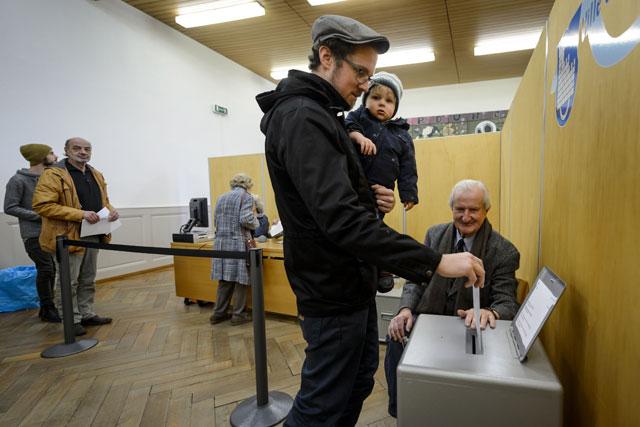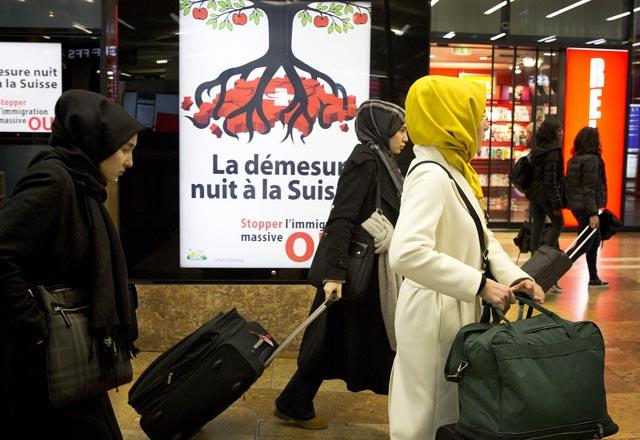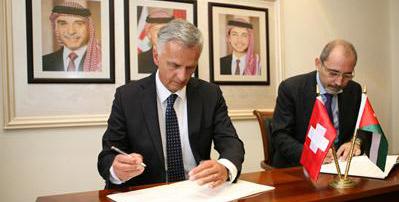GENEVA — Reeling Monday from a vote to cap EU immigration, Switzerland’s government and business community moved to limit the damage to trade ties with the big European bloc.
Foreign Minister Didier Burkhalter played down talk of a “Black Sunday” in ties with Brussels, after 50.3 per cent of voters backed a referendum proposal to end a seven-year-old pact that gave equal footing to most EU citizens in the Swiss labour market.
“We need to avoid that kind of language,” he told reporters.
“Switzerland is not going to rip up its deal with the EU on freedom of movement,” he insisted.
Yet that assertion butted up against a so-called “guillotine” clause in a package of deals with EU that said that, if one deal is voided, the others collapse too.
The other deals have to do with issues such as trade between the EU members and non-member Switzerland.
Brussels says it will now scrutinise all EU-Swiss relations as a result of the vote.
The government opposed the “Stop Mass Immigration” proposal — masterminded by the rightwing populist Swiss People’s Party — but the people have the last word on a huge range of issues in the country’s direct democracy.
The party argues that with 80,000 EU citizens arriving per year — more than the 8,000 predicted before the rules were liberalised in 2007 — the nation of eight million people must apply the brakes.
It claims that EU migrants undercut Swiss workers’ salaries, and that overpopulation has driven up rents, stretched the health and education systems, and overloaded the road and rail networks.
While Switzerland has long had a sizable foreign population, over recent years the proportion has climbed from one-fifth to roughly a quarter.
The voted-in measure requires authorities to revive rules that fixed quotas per business sector for work permits that can be issued to EU citizens.
It sets a three-year deadline to renegotiate the labour market deal with Brussels. The existing accord remains in force in the meantime.
While holding out against EU membership, Switzerland has close ties with the 28-nation bloc with which it does the bulk of its trade.
Burkhalter was set to launch a Europe-wide diplomatic drive to explain the vote and seek a solution. Germany, his country’s top commercial partner, was scheduled as his first stop.
But German Finance Minister Wolfgang Schaeuble warned that the result “is going to create plenty of problems for Switzerland in a host of areas”.
In France, Foreign Minister Laurent Fabius said “we will review our relations with Switzerland”.
A magnet for foreign workers
Foreign workers have long been drawn into Switzerland’s wealthy economy, which is this year expected to grow by 2.1 per cent, almost double the rate in the eurozone. Last year, it expanded by 1.9 per cent while the eurozone’s contracted by 0.4 per cent.
Swiss unemployment was 3.5 per cent in January, compared with 12.1 per cent in the eurozone.
The free labour market deal, fully in force since 2007, was part of a package signed in 1999 after five years of talks.
Most recent immigrants in Switzerland come from neighbouring Italy, Germany and France, as well as Portugal.
Switzerland’s business, industry, farm and hospital lobbies opposed the plan set out in the referendum.
“The approval of the ‘Stop Mass Immigration’ plan raises the spectre of a difficult future for those who work the land, but also for all business sectors that need labour and for the entire economy of the country,” Prometerre farming association said Monday.
But at banking giant UBS, chief economist Michael Kalt was sanguine.
“Nothing will change in the short term in Switzerland. The freedom of movement deal is still in force, and there’s a three-year deadline to put the quotas in place,” Kalt told AFP.
Despite the vote, the Swiss franc was unchanged on foreign exchange markets and Kalt did not foresee a direct economic impact.
“But there’s still an indirect risk due to the climate of political uncertainty in the country. Investors might now think twice before coming to Switzerland,” he noted.
Swiss employers’ federation chief Valentin Vogt said the ball was squarely in the political court.
“Business has to wait and see what the politicians are able to negotiate,” Vogt told AFP, adding that there “will be a relatively long period of uncertainty”.
In the event that the government fails to renegotiate the rules before the expiry of the three-year deadline, he predicted a “problem of unseen dimensions”.


















